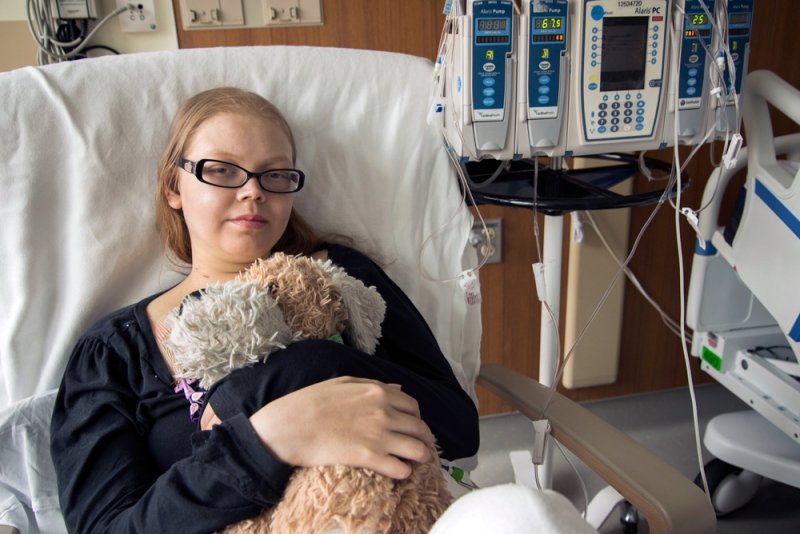 Savana Oberts recovering from transplant surgery in September. Courtesy University of Washington Medical Center.
Savana Oberts recovering from transplant surgery in September. Courtesy University of Washington Medical Center.
Savana Oberts, 26, of Lakebay, is a pioneer. She didn’t set out to be one, but in August she became the first adult in the Pacific Northwest to receive a liver/pancreas/small intestine transplant.
Her mother, Cathy Oberts, shared her story with the KP News.
Five years ago, when Savana was a junior at Western Washington State University, an undetected birth defect caused a sudden, painful kink in her small intestine, cutting off its blood supply. The intestine had to be removed and although the surgery saved her life, Savana could no longer absorb any nutrition by eating. She had to depend on nutrient and calorie-rich fluid delivered directly into her blood stream.
That technology kept Savana alive but tethered to an IV—a situation fraught with medical complications. The intravenous nutrition led to liver damage. Her only long-term chance for survival was a liver and small intestine transplant.
In August, Savana was in the University of Washington Medical Center being treated for an infection of her IV line. Her transplant doctor, Jorge Reyes, was visiting her when he received a call. As he stepped out of the room, she heard him say, “Hold on, I’m in the patient’s room.” He returned soon after and said she needed “a tune-up and to get healthy fast.”
Savana’s medical team had her undergo preoperative testing, confirmed her fluid balance was good and performed the critical tests to determine whether the donor tissue matched. When a person receives an organ transplant, unless it is from an identical twin, it will not be exactly like his or her own. The immune system recognizes those differences and can attack the new organs, causing rejection. There are medications to prevent rejection, but the tissue match must still be close enough to let the drugs do an adequate job.
The tissue match was good. As Dr. Reyes went to Harborview Medical Center to harvest the organs, Savana was taken to the operating room at UW to be prepped and wait for the next news: Would the donated organs be viable?
Dr. Reyes removed the liver, pancreas and small intestine from the donor. They were healthy. Although Savana did not need a pancreas, the three organs are so closely interconnected with blood supply and drainage systems they came as a unit. Savana’s damaged organs were removed and replaced with the donor’s organs after a four-hour surgery.
Just two days elapsed between Dr. Reyes receiving the call and Savana receiving her new organs.
But Savana’s story is still just beginning. There have been some bumps in the road to recovery: there was a bout with pneumonia; her new pancreas became inflamed; her stomach took a month to start working normally again. But overall she has done well. Her family expects her to be released from the hospital by the time this article goes to press.
Savana will be followed closely for signs of rejection and side effects from the new medications. She will live in housing provided for transplant patients for the next few months so that she is close to the hospital. She’ll require drugs to prevent organ rejection for the rest of her life. Once she has recovered, she will be free of intravenous lines.
The family is acutely aware that Savana’s transplant was possible only because another person lost a life. To protect the donor family’s privacy, they have been told nothing. In four months, Savana will be allowed to write to the family while sharing little of her own story. The family can then contact Savana when and if they wish to do so.
Before her transplant, Savana was taking online classes, working toward a teaching certificate. Now she is focusing on one hour and then one day at a time.
Her mother, Cathy, expressed deep gratitude to the Key Peninsula community. Multiple local fundraisers have provided help both with Savana’s uncovered medical expenses and assistance as her family stayed with her in Seattle. “We would like to thank the community for the generosity and support during this time. It means the world to us,” she said.
For more information or to donate to Savana’s recovery, go to helphopelive.org/campaign/2802.
UNDERWRITTEN BY THE FUND FOR NONPROFIT NEWS (NEWSMATCH) AT THE MIAMI FOUNDATION, THE ANGEL GUILD, ADVERTISERS, DONORS AND PEOPLE WHO SUPPORT INDEPENDENT, NONPROFIT LOCAL NEWS